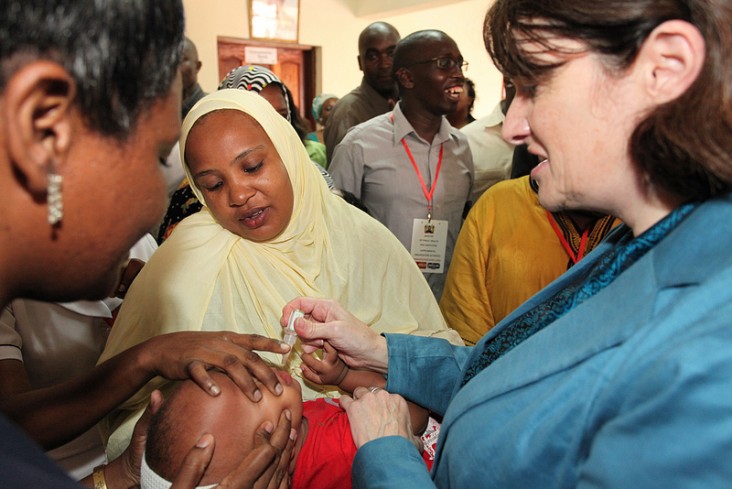
Your Excellency First Lady, Margaret Kenyatta
The Cabinet Secretary for Health Mr. James Macharia
Your Excellency, Governor Hassan Joho
Senator Ali Omar
Senator Harod Chepchumba
County Commissioners Nelson Marwa
Member of Parliament Nyali, Awiti Bollo
Other Members of parliament
Development partners, Ladies and Gentlemen
Ambassador Robert Godec and Karen Freeman, the Mission Director for the U.S. Agency for International Development, USAID, are unable to be here today as we are celebrating our nation’s Independence Day. On behalf of the United States Government, I would like to congratulate the Government of Kenya for the swift response to the outbreak of polio in the Dadaab refugee camp since it was detected in May. USAID recognizes that the Dadaab outbreak is part of a larger outbreak affecting the Horn of Africa and we are committed to supporting a regional and international response.
Your Excellency First Lady Margaret Kenyatta, the American people appreciate that Kenya had become polio free, and remained polio free for more than two years until 2013, when an imported case of polio was detected in the North Eastern part of this country. Since then, the Government of Kenya and its partners have increased efforts to immunize children, recognizing that simple interventions like vaccinations can eliminate preventable diseases.
As of June 6, 2012, there were 67 confirmed cases of polio in the world. At the May 2012 World Health Assembly, polio eradication was declared a global programmatic public health emergency and member states were called on to take the necessary steps to stop transmission and to prevent international spread of virus into polio-free areas. This includes declaring such transmission to be a “national public health emergency” and making poliovirus eradication a national priority as has happened in Kenya.
Reducing the burden of preventable diseases in children is a global priority. Since 2011, the U.S. Government has been implementing President Obama’s Global Health Strategy in Kenya, which focuses on women, girls and children, by providing long-term financial support and technical expert assistance from its Centers for Disease Control, CDC, and USAID. We have intensified efforts to support the Government of Kenya to achieve the fourth and fifth Millennium Development Goals to reduce deaths among newborns, children and mothers.
Kenya has made remarkable progress in reducing child deaths, with a decline of more than 30% in both child and infant mortality. The major contributing factor is the increase in the percentage of children who are fully immunized against preventable childhood diseases to 93%. We have witnessed strong support for the polio eradication initiative in Kenya and continued commitment to the promotion of vaccination and the rapid response to any case of acute flaccid paralysis.
The U.S. Government has a strong commitment to fighting polio. CDC works to improve oversight and accountability of program implementation; sustains supplementary immunization activities; procures vaccines; and improves performance quality and monitoring of immunization programs in collaboration with Global Polio Eradication Initiative partners, USAID and other U. S. Government agencies, and Kenya’s Ministry of Health.
USAID supports polio surveillance and community mobilization in various counties across Kenya.
Your Excellency Margaret Kenyatta, the U.S. Government is cognizant of the fact that in order to eliminate polio globally by 2018 there is an urgent need to mobilize financial assistance nationally and internationally. Currently there is a large funding gap and immunization campaigns are being scaled back, especially in Africa. Recently USAID convened a series of donor meetings in Nairobi to coordinate financial support for responding to the Horn of Africa outbreak. There has been a surge of international support for Kenya in the recent weeks. The Government of Kenya has committed substantial funding towards the polio effort, enabling counties to prepare for the National Campaign that begins this month.
The United States and Kenya enjoy a close relationship that goes back 50 years. We remain fully committed to supporting the Government of Kenya’s endeavors in the health sector. The support we have provided for the logistical arrangement of this national launch is part of our on-going investment in helping Kenya eradicate polio. We have procured 600,000 doses of polio vaccine and, through our AIDS, Population and Health Integrated Assistance program, APHIA, we will support community mobilization efforts to ensure that caregivers bring their children to receive this life saving vaccine.
Your Excellency First Lady Margaret Kenyatta , on behalf of the American people, thank you for your leadership in protecting the health of the children of Kenya. Your commitment and dedication serves to draw the attention of all Kenyans, and the world. You remind us that, together, we can protect our children from preventable diseases that undermine their potential. The U. S. Government remains a committed and engaged development partner in the global polio eradication initiative.
Related Speeches
- 6th Mara Day Celebration - Remarks by Brad Arsenault, Deputy Director for East Africa and Operations, Environment Office, USAID Kenya and East Africa
- Signing of a Memorandum of Understanding between Power Africa and the Nile Basin Initiative - Remarks by USAID Kenya and East Africa Deputy Mission Director Dr. Tina Dooley-Jones







Comment
Make a general inquiry or suggest an improvement.